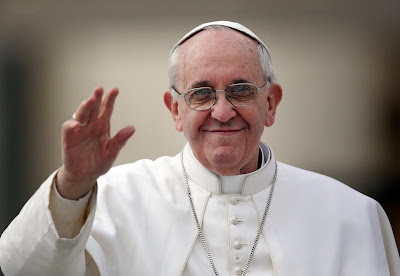 |
| Pope Francis |
largest Christian churches, the Vatican announced Friday.
The gathering
will be the first of its kind since a schism in the 11th Century split
Christianity into Western and Eastern branches.
The
two wings have been estranged ever since with each maintaining for
centuries that they are the true heritors of the early Christian church
established by the apostles of Jesus Christ.
Relations
have warmed of late between Rome and other branches of the Orthodox
tradition, but the Russian one, the most influential in the Eastern
family, has maintained its distance, until now.
With
Pope Francis having adopted an "any time, any place" approach since his
2013 election, the once-in-a-millennium sitdown has been set for
Havana's Jose Marti International Airport on February 12.
Francis
will stop over on his way to a scheduled visit to Mexico while Kirill
is due on the communist island for the first leg of a February 11-22
trip to Latin America which will also take in Paraguay, Chile and
Brazil.
A spokesman for the Russian
church said the meeting would be principally focused on the persecution
of Christians around the world and that a joint declaration would be
issued after a private conversation between the two leaders.
- Ukraine fallout -
"The
current situation in the Middle East, North and Central Africa and in
several other regions where extremists are conducting a veritable
genocide against Christian populations, requires urgent measures and
real cooperation between Christian churches," the Moscow-based Church
said in a statement.
"That is why, despite the obstacles, the decision to organise a meeting between Patriarch Kirill and Pope Francis was taken."
The
meeting has been on the cards for some time with Francis having said in
2014 that he had told Kirill to just "call me and I'll come."
Relations between the two
churches were framed by the bitter legacy of the Great Schism of 1054
and the recriminations, including mutual excommunications and the
violence associated with the Crusades, that followed.
The
Orthodox Church's refusal to accept the authority of the Roman pontiff
has long been the primary barrier to reconciliation. In the Eastern
tradition, all bishops are considered equal with church governance the
responsibility of synods.
Culturally-rooted
differences over forms of worship and observance, such as the eating of
unleavened bread, contributed to the schism although many historians
see it as having been primarily driven by the prevailing political
forces.
More recently Vatican-Moscow relations have been strained by the fallout from the conflict in Ukraine.
Russian
Orthodox officials have accused Catholics in Ukraine, who use Eastern
forms of worship but are loyal to Rome, of both evangelism and fomenting
Ukrainian nationalism.
There is also a festering
dispute over the ownership of church properties confiscated from Eastern
Rite Catholics during the reign of Soviet dictator Josef Stalin, some
of which were reclaimed from the Russian Orthodox church following the
fall of communism.
Since
becoming Pope, Francis has met twice with Patriarch Bartholomew, an
Istanbul-based cleric who is considered the ecumenical head of the
Eastern Orthodox church but does not have the same ecclesiastical clout
as Russia's Kirill.
The
various Orthodox churches count some 260-300 million followers, with the
Russian branch accounting for 165 million of them. In comparison, the
Catholic church claims 1.2 billion members around the globe.
Francis has also made a priority of improving relations between Roman Catholicism and other religions.
He
has defended Islam as a peaceful faith and the last month has seen him
visit the main synagogue in Rome and announce plans to visit Sweden in
October for a ecumenical service to mark next year's 500th anniversary
of the Protestant reformation in Europe.
Source: AFP




No comments:
Post a Comment